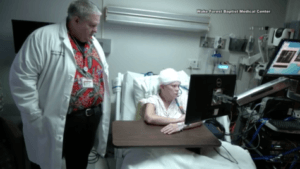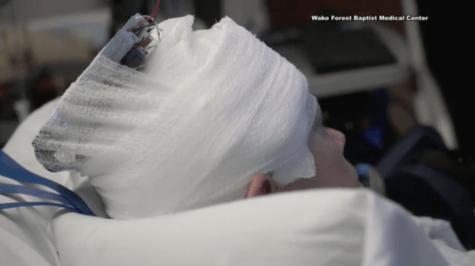WINSTON-SALEM, N. C. — We’re familiar with the amazing power of prosthetic limbs, but scientists have taken the power of prostheses to a new level. A pilot study conducted by a team of researchers from Wake Forest Baptist Medical Center and the University of Southern California successfully implemented a prosthetic memory system in a human brain.
The technology taps into an individual’s natural memory patterns to strengthen the brain’s ability to encode and recall information. Researchers found that the system improved a patient’s short-term memory performance by nearly 40 percent. In particular, it helps with an individual’s episodic memory, which is what Alzheimer’s patients or those who suffer strokes and head trauma typically see weaken.

The study tested the prosthetic memory system on epilepsy patients who were already participating in a diagnostic brain-mapping procedure using surgically-implanted electrodes in different parts of the brain to detect seizures. They sought to influence the firing patterns of neurons in hippocampus, the part of the brain that oversees new memories.
To do this, the scientists used the electrodes to record the firing patterns while the patients participated in a computerized memory test. The patients were shown an image, and then after a brief pause in which the screen went black, they were tasked with picking that image out of a group of others. When correct responses were made, the team was able to create a unique “code” from the neural firing patterns.
The researchers then synthesized that code within the prosthetic memory system and played it back to the patients as they performed the image task again. Participants showed a 37 percent improvement in correct responses using the system.
“This is the first time scientists have been able to identify a patient’s own brain cell code or pattern for memory and, in essence, ‘write in’ that code to make existing memory work better, an important first step in potentially restoring memory loss,” explains study lead author Dr. Robert Hampson, a professor of physiology/pharmacology and neurology at Wake Forest Baptist, in a news release.
A second test had participants perform the same memory task, but had to wait up to 75 minutes before being asked to pick the correct original image. When the prosthetic memory system was activated with the longer delay, participants showed a 35 percent improvement in recall.
“We showed that we could tap into a patient’s own memory content, reinforce it and feed it back to the patient,” says Hampson. “Even when a person’s memory is impaired, it is possible to identify the neural firing patterns that indicate correct memory formation and separate them from the patterns that are incorrect. We can then feed in the correct patterns to assist the patient’s brain in accurately forming new memories, not as a replacement for innate memory function, but as a boost to it.”
The researchers hope the technology as they continue to build it will eventually help people recall long-term memories that are particularly meaningful to patients.
“To date we’ve been trying to determine whether we can improve the memory skill people still have. In the future, we hope to be able to help people hold onto specific memories, such as where they live or what their grandkids look like, when their overall memory begins to fail,” says Hampson.
The study, funded by the United States Defense Advanced Research Projects Agency, was published March 28th in the Journal of Neural Engineering.

DARPA for the win. Wish I could remember what it stood for.
you do rember
“Rember” is not a word, stupid. You can’t even remember how to correctly spell a word you just read literally seconds earlier. You can’t even remember how many syllables are in the word.
What a horribly incompetent man you must be.
Total Recall…
Where did I leave my car key or my glasses……I could use a little of that stuff.
Oh wait until the hacking happens lmfao u are an idiot to EVER get this. If you do you deserve all the devastation that will come with it.
Hey–where do I sign up?
I dunno, maybe I’ve read too many science fiction novels or maybe I’m just being super paranoid but I’m not exactly reassured by this breakthrough. One day science can help me never lose my keys and maybe the next science will be able to fabricate a memory of keys. Just imagine, searching for keys that never existed anywhere except for in your memory, pranks will never be the same. :^)
Lotsa cynical commentary here (for good reason) unfortunately. Seems to me though this tech could be a societal boon with the proper application.
When was the last time technology was properly applied?
who determines “properly?
False memories? hmmmmm
Could it help my wife forget about my girlfriend?
Perhaps it could help your wife make you forget your girlfriend… 😀
I hope it helps memory loss.
Right now, I have to use Google.
That doctor is huge!
As for the memory thing… over time keep adding tech and offloading brain functions. Eventually you will have a 100% tech brain and you would no longer need a body. They would need to have a way to secure it…which is probably not possible.
Not sure I really want my head in the Cloud.
It’s bad enough that I have to worry about my accounts getting hacked, much less my brain. Instead of subliminal images in films, I wonder if they could broadcast code to program thoughts remotely? We could wake up one day with a new government and wouldn’t think anything of it.
just what the democrats are looking for, mindless robots
If you think Facebook and Google have too much information on you now, wait till they’re scraping your memories.
People will be amazed when they see the ad for that candy bar they haven’t had since you were 8 years old.
Yummy! Marathon Bar!!!!! Thanks for bringing that memory back for me! 😀
Studies with electrodes from “machinery’ implanted in head are of great interest to researchers.
Patients would like to see a system developed for actual clinical application in real life.
ROFL! I wonder how many people were actually stupid enough to read anything past this joke headline
Sounds good. Maybe education can simply be implanted. Languages maybe. What if it became possible to duplicate whatever a dog knows and feels and implant it in a human….
intelligence never will be
what’s everything to someone and nothing to everyone else?
Any technical advancement will be used by the government for warfare against its enemies and its citizens!
This will be great for smoking weed and forgetting you’re cell phone at your friends house before you leave!
Or living in Oregon, apparently.
“If I go insane,
Please don’t put
Your wires
In my brain”
Pink Floyd, “If..” 1968